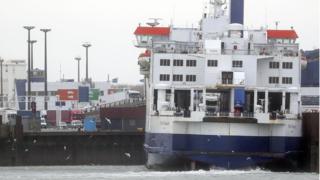Brexit: UK backtracks on full EU border checks amid coronavirus crisis
 Image copyright PA Media
Image copyright PA Media The government is expected to apply much less rigorous EU border checks on imports than it initially had planned, after the Brexit transition period finishes at the end of this year.
The Financial Times reports ministers have abandoned plans to introduce full checks after pressure from businesses.
A government source told the BBC it would take a «pragmatic and flexible approach» due to coronavirus.
The UK had committed to introduce import controls on EU goods in January.
But the source said ministers recognised the impact the virus was having on businesses, and so pragmatism and flexibility on imports made sense – «to help business adjust to the changes» that were now imminent.
The UK left the European Union at the end of January, but is in a transition period until the end of this year.
The government is expected to formally confirm soon it will not ask for an extension to the transition period – despite the coronavirus crisis.
However, there will be an about turn, in the short term at least, on the checks carried out on imports.
In February, Cabinet Office minister Michael Gove said import controls were «necessary» to keep the country’s borders «safe and secure» and to collect the appropriate taxes.
Now a «temporary light-touch regime» is planned at UK ports such as Dover, regardless of whether a deal is done with the EU or not, according to the Financial Times.
The proposal applies only to rules on imports, which the UK will set.
Checks on exports to the EU will be determined by Brussels.
‘A lighter touch’
Brexit might have gone quiet, but it has not gone away.
Sorting out all the kit and staff to have full import controls in place by January was a big ask before the pandemic.
Doing it during one, with businesses clamouring that they are already being hammered by the virus, wasn’t practical.
So, an about turn in the short term – and a lighter touch.
Not our old friend the U-turn, sources insist, because this isn’t the long-term plan, but will help with the adjustments businesses will soon have to make.
If you thought you had heard the last of Brexit, think again.
Prime Minister Boris Johnson will meet the presidents of the European Commission, Council and Parliament remotely on Monday, as negotiations step up to attempt to secure a trade deal with the EU.
Negotiating teams in the UK and the EU have also agreed to «an intensified timetable» for July, with possible discussions in person if public health guidelines enable them during the pandemic, a Downing Street spokesman said.
No 10 said the pace of talks would be scaled up so negotiators will meet in each of the five weeks between 29 June and 27 July.
The new details came after the fourth round of negotiations failed to reach a breakthrough last week.
Speaking in Brussels, EU chief negotiator Michel Barnier accused the UK of having «backtracking» on the agreed political declaration, and said there had been «no significant areas of progress».
Mr Barnier’s counterpart in Downing Street, David Frost, said they would have to «intensify and accelerate» the process if there was to be any chance of an agreement.
Both sides also said the remote meetings had reached their limit and that face-to-face meetings would be needed in order to progress.
The UK has until the end of June to ask for the «transition period» – during which the country stays in the single market and customs union – to be extended into next year. But the prime minister has repeatedly ruled this out.


